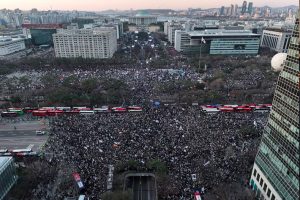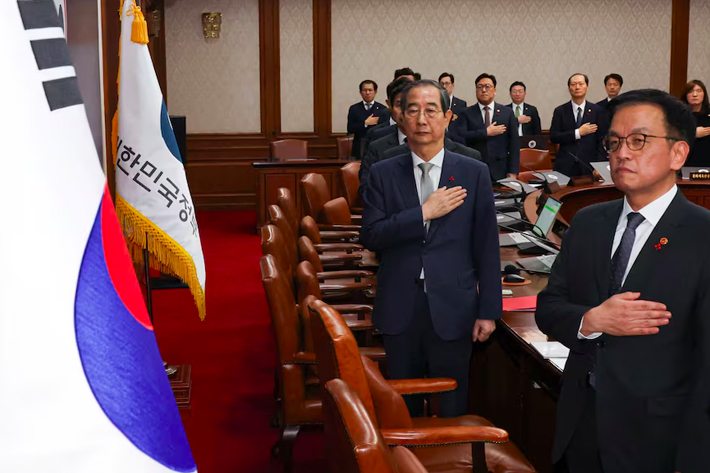South Korea’s acting president and finance ministry have reaffirmed their commitment to keeping the country’s financial and foreign exchange markets stable amid continuing political turmoil, following the impeachment of President Yoon Suk Yeol.
Yoon was impeached on Saturday over his shock attempt to impose martial law in the country early this month.
Prime Minister Han Duck-soo, a longtime technocrat, was effectively elevated to acting president in accordance with the constitution.
Also on AF: Russian Tankers Sink in Black Sea, US Warns on ‘Dark Fleet’
As part of his first moves after becoming acting president, Han moved to calm financial markets by assuring that the country will “carry out its foreign and security policies without disruption.”
He also spoke with US President Joe Biden to reassure the country’s biggest ally, while also vowing to maintain military readiness to prevent any breach of national security by key rival North Korea.
In a further attempt to calm nerves the main opposition party announced it would not seek to impeach Han for his involvement in Yoon’s martial law decision.
Those moves led South Korea’s markets to their highest level in more than two weeks as they opened on Monday. The South Korean won also strengthened and the benchmark bond yield rose.
But the Kospi pared most of its gains by the time it closed, as investors moved to book profits after seeing gains of more than 4% over the last five sessions.
The Kospi is rebounding from 13-month lows after Yoon’s short-lived martial law declaration and the ensuing political crisis spooked markets. The crisis also pushed the won to two-year lows.
“Political risk is lowered and is now a manageable uncertainty,” Han Ji-young, a market analyst at Kiwoom Securities, told Reuters.
Looming economic worry
Continuing uncertainty over the future of financial and foreign exchange markets stems from concern that the country’s political turmoil might persist for several months.
Early on Monday, the finance minister, Bank of Korea governor and top financial regulators met and pledged round-the-clock monitoring of financial and foreign exchange markets.
That was after the finance ministry vowed on Sunday to continue to swiftly deploy market stabilising measures as needed.

The ministry said it will actively communicate with the parliament to keep the economy stable, adding that it plans to announce its biannual policy plan before the end of this year.
The Bank of Korea also said it would use all available policy instruments in conjunction with the government to respond to and avert any escalation of volatility in financial and foreign exchange markets.
The bank said it is necessary to respond more actively to the economic impact than in past presidential impeachment periods due to heightened challenges in external conditions, such as increased uncertainty in the trading environment and intensified global competition in key industries.
South Korea’s financial regulator said in a statement that financial markets are expected to stabilise as recent events are considered temporary shocks, but it will expand market-stabilising funds if needed.
What’s next after Yoon’s impeachment?
Experts say that even with an acting president in place, South Korea’s international partners face months of uncertainty before a new president can be elected and a new government established.
Yoon has remained defiant, and vowed to fight for his political future. Prosecutors say he has not appeared in response to a summons for questioning in a criminal investigation.
A joint team from the police, the defence ministry and an anti-corruption agency are planning to call him in for questioning on Wednesday, a police official told Reuters.
Yoon and a number of senior officials face potential charges of insurrection, abuse of authority and obstructing people from exercising their rights.
Meanwhile, South Korea’s Constitutional Court began reviewing Yoon’s impeachment on Monday.
The court has up to six months to decide whether to remove or reinstate Yoon. If he is removed or resigns, new elections will be held within 60 days.
The court will hold the first public hearing on December 27.
- Reuters, with additional editing and inputs from Vishakha Saxena
Also read:
South Korea Left Without a Leader as Crucial Trump Tariffs Loom
Top Korea Leader Thought Martial Law Declaration Was Deepfake
US Pressing Korean Chipmakers For More China Chip Curbs
China Welcomes ‘New Beginning’ Of Ties with Korea, Japan
South Korea to Announce $7 Billion Package For Chip Industry
























